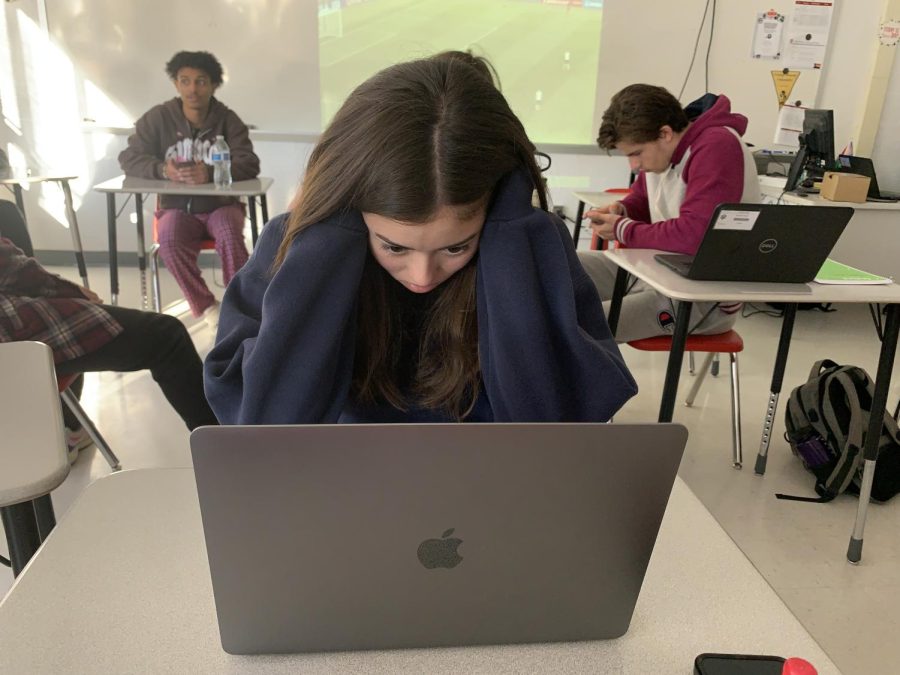Learning Loss: Resolving the education fallout from the pandemic
Senior Chelsi Lilli struggles to understand an assignment in her IB math class, while students in the back avoid learning alltogether.
The Covid-19 pandemic has all but subsided. At the very least, it has declined to where it is no longer a dangerous day-to-day threat to most Americans.
Despite the lack of severe cases and headlines, the impact of the pandemic is still rearing its head in our education systems across the country.
Learning loss is a relatively self explanatory concept. It is shown in students who show a decline in academic skills or performance over the course of time.
Since the Covid-19 pandemic and online learning, learning loss has increased significantly and given students an uphill battle back to the top of the learning curve. Understandably so, as students missed multiple months of school, and were forced to learn in an online environment during their formative years.
“I believe that having a limited experience in middle school has severely affected my capability to absorb information and relay it at an honors level,” freshman Cole Cardwell said.
Cardwell is one of hundreds of underclassmen who missed out on the majority of middle school, which has had a negative effect on students’ test scores and educational performance.
The N.A.E.P. is a predominant educational assessment that is commonly used as the nation’s report card. Their 2022 report on educational performance only furthered the narrative of learning loss.
450,000 fourth and eighth graders were included in the recent study, and they were collected to create a national perspective. Testing was done in regards to math and reading, and results showed that both the fourth and eighth graders suffered declines in both math and reading scores.
The most drastic of which came in the math section for the eighth graders, as the 2019 national average of 282 fell eight points to 274 in the recent 2022 polling.
Mathematics test scores fell the most because math is taught in a linear progression. The concepts and level of difficulty progress so that if you were to miss an entire year of learning, it would have a negative impact on your learning ability in the subject moving forward.
While the statistics do not reflect an emergency level of concern, they do signal a potential loss in critical problem solving and comprehension skills in young students across the US.
These statistics are not empty, and the issue of learning loss has even had an impact here at AHS.
“I feel that online learning had a negative impact on my learning ability, as well as the people around me,” senior Andrew Lizarazu said. “We are still recovering, and I think it is something that the school and the IB program are making a conscious effort to resolve.”
As an IB school, many students within AHS are involved in IB classes or the IB diploma program.
IB has publicly acknowledged that learning loss occurred during the pandemic. They have adjusted the curriculum and exam benchmarks to account for students who could be possibly dealing with outside factors in the pandemic, and how they could impact students’ educational performance.
“I think the pandemic’s effect on students’ learning abilities is still being felt,” senior Nicole Perez said. “The impact can be measured quantitatively and qualitatively, as we can measure students’ performance in the classroom and on test scores, but there has also been a physiological impact that is hard to quantify on an accurate scale.”
In addition to the IB curriculum being adjusted for learning loss, AHS has adjusted the way that honors courses are operated as well to make them easier for students.
The primary gap between honors and standard level classes has closed immensely, and teachers are now often instructed to teach similar material to their students in honors and standard level classes.
Over recent years, AHS has shifted the structure of honors classes to match that of standard classes. They have also both taken on a policy of minimal homework, and summative assessments have been adjusted to account for students’ learning loss.
While this decision has some benefits, it could also hurt students in their preparation for IB courses in eleventh and twelfth grade. The IB program is extensive and difficult, and a combination of pandemic learning loss and unchallenging honors courses could be detrimental to students’ performance later in high school.
While AHS attempts to resolve learning loss and return academic performance to its peak, it is important for the school to toe the line between accounting for students’ lack of learning while challenging them for future opportunities.

Senior David Sewall is the Editor in Chief of The A-Blast. This is his third year on staff, he previously worked as the Sports Editor and as a Staff Writer....












